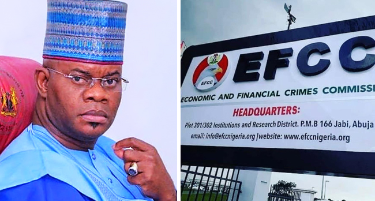In a significant legal development, Justice John Tsoho, the Chief Judge of the Federal High Court, has instructed that the request by Yahaya Bello, the former Governor of Kogi State, to transfer his alleged money laundering case to Kogi State, must be heard in open court. This directive was conveyed in a letter addressed to Bello’s legal representatives, Messrs. Abdul Wahab Muhammed and Musa Yakubu.
Justice Tsoho’s letter, signed by his special assistant, emphasized the existence of a pending appeal in the case titled “Yahaya Adoza Bello vs FRN.” In this appeal, filed on May 17, 2024, Bello, as the appellant, had sought an order for the reassignment of his case to the Chief Judge. Highlighting the significance of this pending appeal, the Chief Judge pointed out that it would be inappropriate to make any decisions that might influence the outcome of the appeal before it is resolved.
“There is documentary evidence of a pending appeal in the case ‘Yahaya Adoza Bello vs FRN’ filed on 17/05/2024 wherein the defendant, as the appellant, has sought a consequential order remitting the case to the Chief Judge for reassignment. It is not proper to take any step that will be tantamount to pre-empting the outcome of the appeal,” the Chief Judge’s letter stated. He further noted, “The main issue raised is jurisdictional in nature and will be more appropriately decided by the court. The matter should therefore be presented in open court.”
Justice Tsoho underscored that the core of the allegations against the former governor involved the misappropriation of Kogi State funds for the acquisition of properties in Abuja. Given the nature of the allegations, the Chief Judge explained that the case could be filed either in Abuja or Lokoja, as both venues are legally appropriate for such proceedings.
He also referenced two related ongoing cases in the Federal High Court. In case number FHC/ABJ/CR/550/22, titled “FRN vs Ali Bello and Another,” and another similar case involving Ali Bello and three others, there had been previous requests for case transfers. However, in these instances, the lower court had denied the applications for transfer, reinforcing the importance of adhering to proper judicial procedures.
 This development adds another layer to the legal complexities surrounding the former governor. Yahaya Bello’s case has attracted considerable public attention due to the high-profile nature of the allegations and the significant sums of money involved. As the case proceeds, all eyes will be on the court’s handling of the jurisdictional issues and the broader implications for judicial processes in Nigeria.
This development adds another layer to the legal complexities surrounding the former governor. Yahaya Bello’s case has attracted considerable public attention due to the high-profile nature of the allegations and the significant sums of money involved. As the case proceeds, all eyes will be on the court’s handling of the jurisdictional issues and the broader implications for judicial processes in Nigeria.
In conclusion, Justice Tsoho’s decision to mandate an open court hearing for Bello’s transfer request underscores the judiciary’s commitment to transparency and due process. It also highlights the intricate balance between ongoing appeals and the immediate procedural decisions that must be made in high-stakes legal battles.




